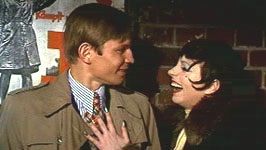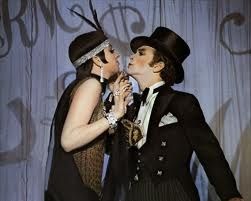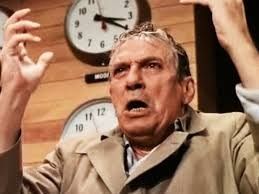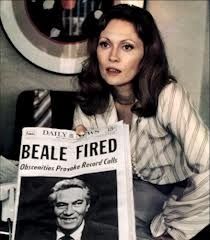Sally: [singing] Life is a cabaret ol' chum, so come to the Cabaret!
Brian Roberts: You're American.
Sally: Oh God, how depressing! You're meant to think I'm an international woman of mystery. I'm working on it like mad.
Cabaret is one of the better musical adaptations. Liza Minnelli, who plays, Sally Bowles, an American girl performing as a singer/dancer at the Kit Kat Klub in early 1930's Berlin, is insanely talented. She is a great singer and an even better dancer and actress.
She befriends Brian, a young British man who is a new arrival in Berlin and is teaching English to support himself. The two begin a relationship, which eventually morphs into a strange menage a trois with a wealthy German aristocrat named Max. This causes tension between Brian and Sally.

Brian initially finds Sally's vivacious, impulsive, and over-dramatic nature charming and fun, but seeing her turn her charms on Max, he begins to perceive her misplaced over-confidence as ridiculous and naive: "Aren't you ever gonna stop deluding yourself, hmm? 'Handling Max?' Behaving like some ludicrous little underage femme fatale? You're -you're about as fatale as an after dinner mint!"
When they are both abandoned by Max after he tires of them, they reconnect in their disappointment.
The story is sad. Sally becomes pregnant, and Brian wants to raise the baby with her in England, though they can't be sure if he is actually the father. He becomes excited about the idea, but Sally balks at the bleak future she sees before her as a poor mother and housewife in England. She still dreams of becoming a big star, and ultimately gets an abortion, devastating Brian:
Brian: You did it, didn't you?
Sally: Did what, darling?
Brian: The abortion. In God's name why?
Sally: One of my whims?
Brian: Is that all you can say? ''One of my whims?'' What right?
Sally: Sally: If you wanna hit me, why don't you just hit me?
Brian: But you wanted it. Didn't you? Me and the baby. I suppose Max Reinhardt did show up at the club. Or was it a friend of a friend of a friend of an assistant director who said he'd try to squeeze you into the chorus line? That is, of course, if you -if you went to bed with him.
Sally: You think that?
Brian: Yes.
Sally: Well then, it's just as well, isn't it? For you, for everyone. And, darling, would you be an angel and just let me get some sleep?
Brian: Tell me why you did it.
Sally: What is there to say? You've said it all in one way or another.
Brian: Sally, please. I have to know.
Sally: Okay. I'm self-centered, inconsiderate...and what was the third adjective? Oh, yes. And I have this infantile fantasy that one day I'll amount to something as an actress. A dinky little cottage in Cambridge? A playpen in the bedroom, diapers on the towel rack...How soon would it be before we started hating each other?
He forgives her, but the relationship is broken beyond repair, and he soon returns to England without her.
 |
| Performing at the Kit Kat Klub. |
The music and the dance numbers are terrific, and my oldest daughter enjoyed watching them with me, getting a kick out of Sally. I'm happy to be raising another musical theater buff -now I have someone to take to shows with me.
Also present is an ominous undercurrent of danger as we see the Nazi Party continue to rise in power and influence throughout the movie.
It's not a happy story, but it's worth seeing, and the soundtrack is worth buying.


